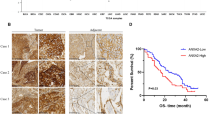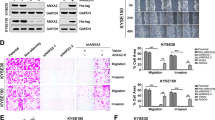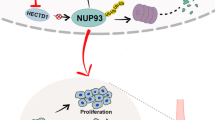Abstract
Esophageal squamous cell carcinoma (ESCC) is one of the lethal malignancies commonly found in the eastern world, with overall five-year survival rates less than 25%. The present study aimed to investigate the biological function of annexin A3 (ANXA3) in ESCC cell proliferation. The mRNA and protein levels of ANXA3 in ESCC tissues and cell lines were determined by real-time PCR and Western blot, respectively. Lentiviral transduction was applied to overexpress or reduce ANXA3 expression in ESCC cell lines. The effect of ANXA3 on ESCC cell proliferation was evaluated by cell-counting kit-8 assay in vitro and tumor-bearing animal model in vivo. We found that ANXA3 was substantially upregulated in ESCC tissues compared to adjacent normal tissues as well as ESCC cell lines compared to normal esophageal endothelial cells. Suppression of ANXA3 significantly inhibited ESCC cell proliferation in vitro and tumor growth in vivo. We further revealed that NF-κB was involved in ANXA3-mediated ESCC cell proliferation. Our results suggest that ANXA3 acts as an oncogene in ESCC, and targeting ANXA3 or NF-κB may serve as potential therapeutic strategies for patients with ESCC.






Similar content being viewed by others
References
Abbas G, Krasna M (2017) Overview of esophageal cancer. Ann Cardiothorac Surg 6:131–136
Baba Y, Watanabe M, Yoshida N, Baba H (2014) Neoadjuvant treatment for esophageal squamous cell carcinoma. World J Gastrointest Oncol 6:121–128
Baine MJ, Chakraborty S, Smith LM, Mallya K, Sasson AR, Brand RE, Batra SK (2011) Transcriptional profiling of peripheral blood mononuclear cells in pancreatic cancer patients identifies novel genes with potential diagnostic utility. PLoS One 6:e17014
Bianchi C, Bombelli S, Raimondo F, Torsello B, Angeloni V, Ferrero S, Di Stefano V, Chinello C, Cifola I, Invernizzi L, Brambilla P, Magni F, Pitto M, Zanetti G, Mocarelli P, Perego RA (2010) Primary cell cultures from human renal cortex and renal-cell carcinoma evidence a differential expression of two spliced isoforms of Annexin A3. Am J Pathol 176:1660–1670
Du R, Liu B, Zhou L, Wang D, He X, Xu X, Zhang L, Niu C, Liu S (2018) Downregulation of annexin A3 inhibits tumor metastasis and decreases drug resistance in breast cancer. Cell Death Dis 9:126
Ganesan T, Sinniah A, Ibrahim ZA, Chik Z, Alshawsh MA (2020) Annexin A1: A Bane or a Boon in Cancer? A Systematic Review. Molecules. https://doi.org/10.3390/molecules25163700
Jami SK, Clark GB, Ayele BT, Ashe P, Kirti PB (2012) Genome-wide comparative analysis of annexin superfamily in plants. PLoS One 7:e47801
Kollermann J, Schlomm T, Bang H, Schwall GP, von Eichel-Streiber C, Simon R, Schostak M, Huland H, Berg W, Sauter G, Klocker H, Schrattenholz A (2008) Expression and prognostic relevance of annexin A3 in prostate cancer. Eur Urol 54:1314–1323
Konopka-Postupolska D, Clark G (2017) Annexins as Overlooked Regulators of Membrane Trafficking in Plant Cells. Int J Mol Sci. https://doi.org/10.3390/ijms18040863
Li B, Li YY, Tsao SW, Cheung AL (2009) Targeting NF-kappaB signaling pathway suppresses tumor growth, angiogenesis, and metastasis of human esophageal cancer. Mol Cancer Ther 8:2635–2644
Liu T, Zhang L, Joo D, Sun SC (2017) NF-kappaB signaling in inflammation. Signal Transduct Target Ther. https://doi.org/10.1038/sigtrans.2017.23
Lizarbe MA, Barrasa JI, Olmo N, Gavilanes F, Turnay J (2013) Annexin-phospholipid interactions. Functional Implications Int J Mol Sci 14:2652–2683
Moss SE, Morgan RO (2004) The annexins. Genome Biol 5:219
Napier KJ, Scheerer M, Misra S (2014) Esophageal cancer: A Review of epidemiology, pathogenesis, staging workup and treatment modalities. World J Gastrointest Oncol 6:112–120
Pan QZ, Pan K, Weng DS, Zhao JJ, Zhang XF, Wang DD, Lv L, Jiang SS, Zheng HX, Xia JC (2015) Annexin A3 promotes tumorigenesis and resistance to chemotherapy in hepatocellular carcinoma. Mol Carcinog 54:598–607
Schloer S, Pajonczyk D, Rescher U (2018) Annexins in Translational Research: Hidden Treasures to Be Found. Int J Mol Sci. https://doi.org/10.3390/ijms19061781
Tu CC, Hsu PK (2018) The frontline of esophageal cancer treatment: questions to be asked and answered. Ann Transl Med 6:83
Wu N, Liu S, Guo C, Hou Z, Sun MZ (2013) The role of annexin A3 playing in cancers. Clin Transl Oncol 15:106–110
Xie YQ, Fu D, He ZH, Tan QD (2013) Prognostic value of Annexin A3 in human colorectal cancer and its correlation with hypoxia-inducible factor-1alpha. Oncol Lett 6:1631–1635
Xu R, Yin J, Zhang Y, Zhang S (2019) Annexin A3 depletion overcomes resistance to oxaliplatin in colorectal cancer via the MAPK signaling pathway. J Cell Biochem 120:14585–14593
Yin J, Yan X, Yao X, Zhang Y, Shan Y, Mao N, Yang Y, Pan L (2012) Secretion of annexin A3 from ovarian cancer cells and its association with platinum resistance in ovarian cancer patients. J Cell Mol Med 16:337–348
Zhai JM, Sun SJ, Wang W, Zeng C (2014) Expression of annexin A3 in gastric cancer and its correlation with proliferation and apoptosis. Asian Pac J Cancer Prev 15:3001–3004
Zhang Z, Huang L, Zhao W, Rigas B (2010) Annexin 1 induced by anti-inflammatory drugs binds to NF-kappaB and inhibits its activation: anticancer effects in vitro and in vivo. Cancer Res 70:2379–2388
Zhou T, Li Y, Yang L, Tang T, Zhang L, Shi J (2017) Annexin A3 as a Prognostic Biomarker for Breast Cancer: A Retrospective Study. Biomed Res Int 2017:2603685
Zhuang C, Wang P, Sun T, Zheng L, Ming L (2019) Expression levels and prognostic values of annexins in liver cancer. Oncol Lett 18:6657–6669
Acknowledgements
None.
Funding
None.
Author information
Authors and Affiliations
Corresponding author
Ethics declarations
Conflict of interest
The authors declare that they have no competing interests.
Research involving Human Participants
The study was approved by the Ethics Committee of Gucheng County Hospital. All procedures performed in studies involving human participants were in accordance with the ethical standards of the institutional and/or national research committee and with the 1964 Helsinki declaration and its later amendments or comparable ethical standards.
Informed consent
Informed consent was obtained from all individual participants included in the study.
Additional information
Publisher's Note
Springer Nature remains neutral with regard to jurisdictional claims in published maps and institutional affiliations.
Rights and permissions
About this article
Cite this article
Gao, S., Wang, Z., Liu, X. et al. The calcimedin annexin A3 displays tumor-promoting effect in esophageal squamous cell carcinoma by activating NF-κB signaling. Mamm Genome 32, 381–388 (2021). https://doi.org/10.1007/s00335-021-09883-3
Received:
Accepted:
Published:
Issue Date:
DOI: https://doi.org/10.1007/s00335-021-09883-3




